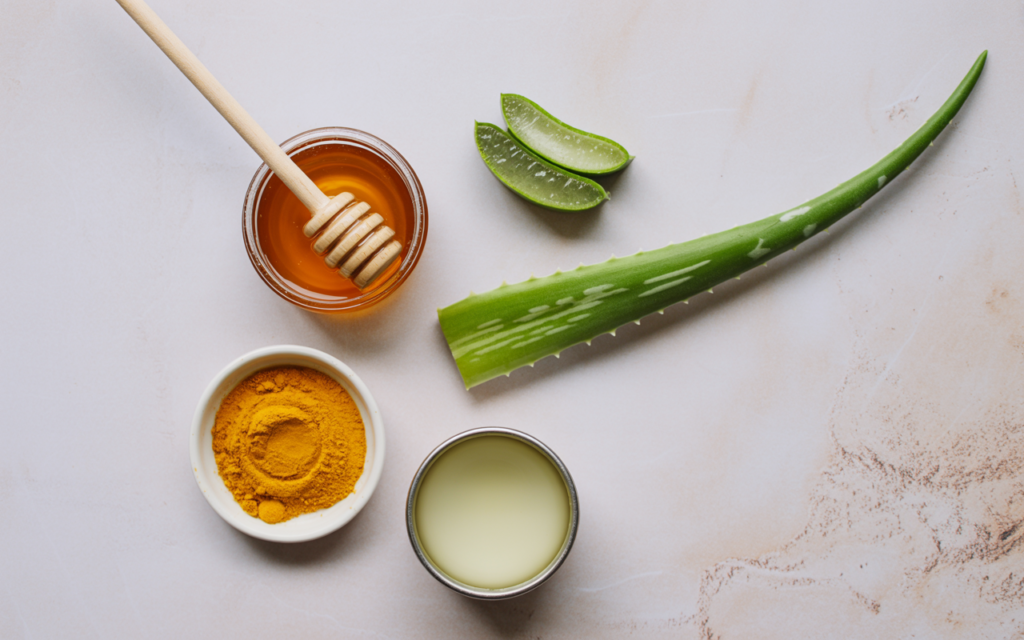From a scraped knee on the playground to an accidental kitchen cut, life is full of minor injuries. When these moments happen, our first instinct is often to reach for the first-aid kit. But for centuries, before modern medicine became commonplace, people relied on what nature provided. This has led to a growing interest in understanding natural remedies for open wounds. This guide is designed to be your comprehensive resource, exploring the traditional, plant-based, and simple household items that have been used to care for minor skin breaks.
We will delve into these methods with a focus on safety, proper application, and understanding the important line between what can be managed at home and what requires professional medical attention. This exploration of natural remedies for open wounds is about empowering you with knowledge, not replacing the crucial advice of a healthcare provider.
The First and Most Important Step: When Not to Use Natural Remedies for Open Wounds
Before we explore any remedy, natural or otherwise, we must establish a critical safety baseline. The information in this guide is intended for minor cuts, scrapes, and abrasions only. You should seek immediate medical attention and should not attempt to use natural remedies for open wounds in any of the following situations:
- Deep Punctures: Wounds that are deep, especially from rusty or dirty objects like nails.
- Uncontrolled Bleeding: Any wound that does not stop bleeding after 10-15 minutes of direct, firm pressure.
- Animal or Human Bites: These wounds have a very high risk of serious infection.
- Large Wounds: Wounds that are gaping open and may require stitches to heal properly.
- Signs of Infection: Increasing redness, swelling, warmth, pus, red streaks spreading from the wound, or a fever.
- Wounds on the Face or Joints: These areas are more prone to scarring and complications.
- If You Have a Compromised Immune System: Conditions like diabetes can impair healing and increase infection risk.
Understanding these boundaries is the most important part of safely considering natural remedies for open wounds. When in doubt, always see a doctor.

The Foundation of Wound Care: Cleaning and Preparation
No matter what remedy you plan to use, the absolute first step is to properly clean the wound. This step is non-negotiable and is more important than any substance you apply afterward. Skipping this can trap bacteria inside the wound, leading to infection.
- Wash Your Hands: Before touching the wound, wash your hands thoroughly with soap and water.
- Rinse the Wound: Hold the affected area under cool, clean running water for several minutes. This helps to flush out dirt, debris, and bacteria. A gentle, mild soap can be used on the skin around the wound, but try to avoid getting soap directly into the wound itself as it can cause irritation.
- Gently Pat Dry: Use a clean cloth or sterile gauze to gently pat the area dry. Do not use a fluffy cotton ball, as fibers can get stuck in the wound.
This cleaning process is the bedrock of using any natural remedies for open wounds effectively.

Exploring Natural Remedies for Open Wounds: A Detailed Look
With the wound properly cleaned and assessed as minor, we can now explore some of the substances that have been traditionally used. It is vital to remember that individual reactions can vary, and what works for one person may not work for another. Always test a small patch of skin first if you are prone to allergies.
Honey: Nature’s Sweet Healer
Honey, particularly raw or medical-grade honey, has been used for wound care for thousands of years. Its properties make it a fascinating subject in the world of natural remedies for open wounds.
- How It Works: Honey is naturally acidic and has a very low moisture content, which creates an inhospitable environment for bacteria. When it comes into contact with wound fluids, it also slowly releases low levels of hydrogen peroxide, a well-known antiseptic.
- How to Use: After cleaning the wound, apply a thin layer of high-quality raw honey directly onto the wound. Cover it with a sterile bandage or gauze. Change the dressing daily, or more often if it becomes saturated. The use of honey is one of the most well-documented natural remedies for open wounds.
Aloe Vera: The Soothing Plant
The gel from the aloe vera plant is famous for its use on sunburns, but its properties extend to minor cuts and scrapes as well, making it a staple among natural remedies for open wounds.
- How It Works: Aloe vera gel has anti-inflammatory and soothing properties that can help reduce pain and swelling. It also contains compounds that may support skin regeneration and healing.
- How to Use: It is best to use gel directly from the leaf of an aloe plant. Break off a leaf, slice it open, and scoop out the clear gel. Apply a small amount to the cleaned wound. Cover with a bandage. Be aware that some people can have a skin sensitivity to aloe. This is one of the more gentle natural remedies for open wounds.
Turmeric: The Golden Spice
Turmeric contains a powerful compound called curcumin, which is known for its potent anti-inflammatory and antioxidant properties. This has made it a popular choice in traditional medicine and a noteworthy candidate for natural remedies for open wounds.
- How It Works: Curcumin’s anti-inflammatory action can help manage the initial swelling and redness of a minor wound.
- How to Use: You can create a thick paste by mixing a small amount of turmeric powder with a little bit of clean water or a carrier oil like coconut oil. Apply this paste to the cleaned wound and cover it. Be aware that turmeric will temporarily stain the skin yellow. This is a very accessible option when considering natural remedies for open wounds.
Coconut Oil: A Moisturizing Barrier
Coconut oil is prized for its moisturizing properties and the presence of lauric acid, a fatty acid that has demonstrated antimicrobial properties.
- How It Works: Applying coconut oil creates a protective barrier over the wound, which can help keep it moist—a key element for optimal healing—and may help prevent infection from surface bacteria.
- How to Use: Apply a thin layer of virgin coconut oil to the cleaned wound before covering it with a bandage. This simple application makes it an easy-to-use option in the realm of natural remedies for open wounds.

A Comparison of Popular Natural Remedies for Open Wounds
To help you decide which remedy might be suitable for your situation, here’s a simple comparison table.
| Remedy | Primary Action(s) | Best For | Considerations |
|---|---|---|---|
| Honey | Antibacterial, Maintains Moist Environment | Minor cuts and scrapes | Use raw or medical-grade; can be sticky. |
| Aloe Vera | Anti-inflammatory, Soothing, Moisturizing | Minor burns, scrapes, skin irritations | Best from a live plant; potential for skin allergy. |
| Turmeric | Anti-inflammatory | Minor scrapes with initial swelling | Will stain skin and clothes yellow. |
| Coconut Oil | Moisturizing, Creates Protective Barrier | Preventing dryness, minor surface scrapes | Best used on very minor, superficial wounds. |
This table provides a quick overview when you are evaluating natural remedies for open wounds.
Important Lifestyle Factors That Support Healing
Your body’s ability to heal is not just dependent on what you put on a wound. Your overall lifestyle plays a massive role. Supporting your body from the inside is a crucial, though often overlooked, part of the strategy for using natural remedies for open wounds.
Nutrient-Rich Diet
Your body needs the right building blocks to create new tissue.
- Protein: Essential for cell repair and growth. Include lean meats, fish, eggs, beans, and lentils.
- Vitamin C: Crucial for the creation of collagen, the main protein in skin. Found in citrus fruits, bell peppers, broccoli, and berries.
- Zinc: Plays a key role in skin integrity and immune function. Found in nuts, seeds, whole grains, and meat.
A healthy diet is a powerful partner to any natural remedies for open wounds.
Adequate Hydration
Water is essential for every bodily function, including healing. It helps transport nutrients to the wound site and flush out waste products. Staying well-hydrated keeps your skin supple and supports the healing process. This is a simple but effective component of any approach to natural remedies for open wounds.
Rest and Sleep
Your body does most of its repair work while you are asleep. Getting adequate, quality sleep allows your immune system to function optimally and directs energy towards healing the wound. This is a foundational aspect of supporting natural remedies for open wounds.

Frequently Asked Questions (FAQs)
Q: What is the first step for any wound?
A: Always clean it thoroughly with cool, running water to flush out dirt and bacteria before applying any remedy.
Q: Are these remedies safe for children?
A: Use caution, as children’s skin is more sensitive. Always consult a pediatrician before applying any remedy to a child’s wound.
Q: How can I tell if a wound is infected?
A: Look for increasing redness, swelling, pus, warmth, or a fever. If you see any of these signs, stop home treatment and see a doctor immediately.
Q: What is the best natural remedy to use?
A: It depends on the wound. Honey is excellent for its antibacterial properties on minor cuts, while aloe vera is great for soothing scrapes and irritation.
Q: How often should I change the bandage?
A: Change it at least once daily, or anytime it becomes wet or dirty, to keep the wound clean.
Q: Can I put essential oils on an open wound?
A: No. Undiluted essential oils are too strong for broken skin and can cause significant irritation. They should be avoided for direct wound care.
Final Thoughts: A Balanced and Safe Approach
The world of natural remedies for open wounds is a rich and fascinating one, rooted in centuries of tradition and observation. Using substances like honey, aloe vera, or turmeric can be a gentle and effective way to support your body’s innate healing capabilities for minor, everyday injuries.

However, this knowledge must always be paired with a profound respect for safety and the life-saving advancements of modern medicine. The most crucial skills are knowing how to properly clean a wound and, most importantly, recognizing when a wound is not minor and requires the attention of a healthcare professional.
By adopting a balanced approach—using natural remedies for open wounds responsibly for small scrapes while seeking professional care for more serious injuries—you can confidently and safely manage life’s little bumps and cuts. The ultimate goal is always the same: to heal well, to heal safely, and to honor the incredible resilience of the human body. This thoughtful perspective is the best way to apply the knowledge of natural remedies for open wounds.